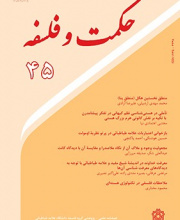
مقالات
کواین و موجهات
تفکر فلسفی در ایران معاصر
حوزههای تخصصی:
Phenomenology and Post-Modernity
حوزههای تخصصی:
The challenge to re-think Post-Modernity opens up if we see modernity in the light ef the phenomenological reduction. 5uspending belief in the central tenets of Modern Philosopf?y discloses that the so-called post• modernist pbilosopby mere!J extends the earlier projec: The failure o] calculative reason trumpeted by po-mo thinkers need not result in the end of the proiect ef rationality. Rather, rethinking the philosophic tradition in a radical fashion leads to greater inclusion ef other perspectives andfaculties and more possibilities far reasoning together in the search for truth.
Sadr-ul-Muta'allehin on Platonic Ideas
حوزههای تخصصی:
Sadr-ul-Muta 'allehin, a prominent figure among Islamic philosophers spent his utmost efforts to connect Islamic philosophy, !ysticism, theology and exegesis of Hojy Qur'an in some of the dijferent discussions such as the Primary and Unit» of the Truth of Being (Esalat va Vahdat-e Haqiqat-e Vojoud), the relationship of causaliry which he has defined as actualization (Tasha'on), analogicalgradation of being (T.ashkik-e Vqjoud) , transubstantiation (Harekat-e Johan), the uniry of the Intelligence and the Intelligible (Ettehad-e 'Aghel va Ma 'ghou, and the immaterialiry of the faculry of imagination (tajarrod-e khia01 and Platonic Ideas. He interpreted the meaning of Platonic Ideas on one qf the mystical theories, i.e. ''immutable essences" (A 'ayan-e Sahetah). The present article elaborates dijferent viewpoints among the Islamic philosophers and the critiques of Sadr-ul-Muta1allehin of their perceptions such as Farabi, Ibn-e Sina (Avicenna), Suhra1vardi1 Dauani, and Mirdamad, and commenting on interpretation of Mulla Sadra and also plans to reviews his eight neu. proofs ofPlatonic Ideas.
Plato and Innatism
حوزههای تخصصی:
Plato 1s doctrine of recollection is often identified witb innatism, and he is said to be an innatist. The present pape0 alongside J,vifh e:x:plaining this doctrine and other related doctrines in Plato's epistemology, argues that the doctrine of recollection is not necessarily the same as innatism. It is a matter of fact that, in Plato's epistemology1 perception and intellectual epistemic activi01 plqy a crucial role in the acquisition of kn01vledge.
Mulla Sadra and God's Detailed Knowledge of Things
حوزههای تخصصی:
Plato maintained that God's knoivledge of things consisted of se!f existent externalforms, i.e. Ideas. Plato's belief has been criticized lry Mui/a 5adra and others. Avicenna believes since God is the knower of His own essence which is the complete cause of things, He is the knower of things. His knowledge of things is a general kn01v!edge and general, in this sense, means lack of transformation of knowledge in accordance witb the transformation of knmvn object. The philosophers after Avicenna criticized him, because his belief necessitates the obstacle of the evacuation of the essence of God from peifection and the dread of subsistence of the empirica! knowledge is essentialfor one who is by essence and act non-material. 5hqykh Ishraq maintains that things, whether material or non-material, are presentfor God, the Exalted, by their own concrete existence. There are also criticisms on 5hqykh Ishraq 's notion, among them is that his opinion on the presence of material things is prohibitedfor God, the Exalted, because materiality and presence do not aggregate. 5adr ul-Muta'alehin has affirmed the detailed kno1vledge of God through the principle of "simple reality is all things" i.e. the knowledge of the Necessary Being of all things is actualized in the stage of His essence before the existence of those things. Allameh Tabatabaii rationalizes the detailed knoivledge of God by the existential application of God which is essential for the assumption of necessity of the existence in• itse!f.